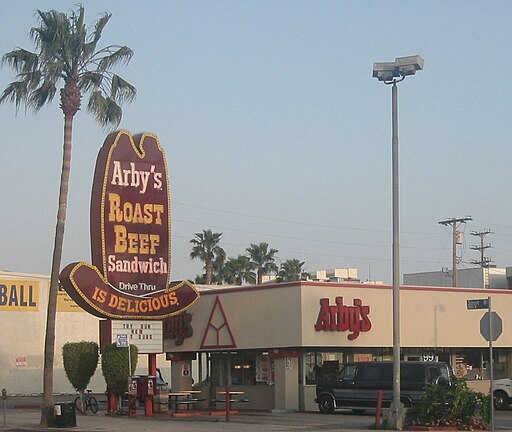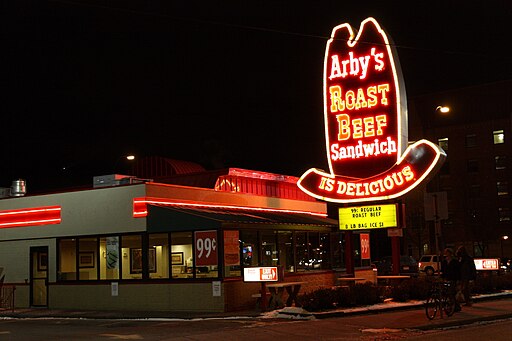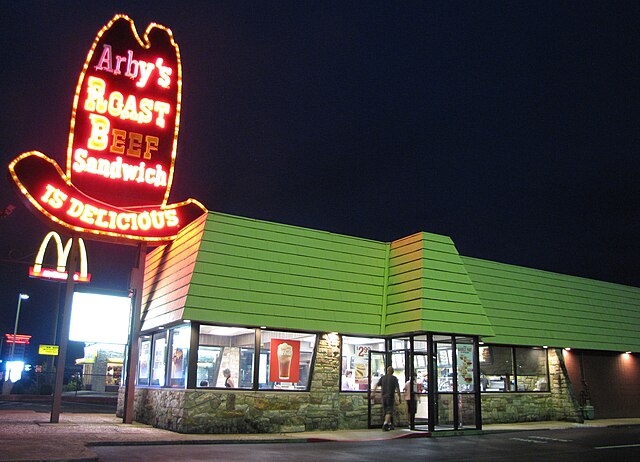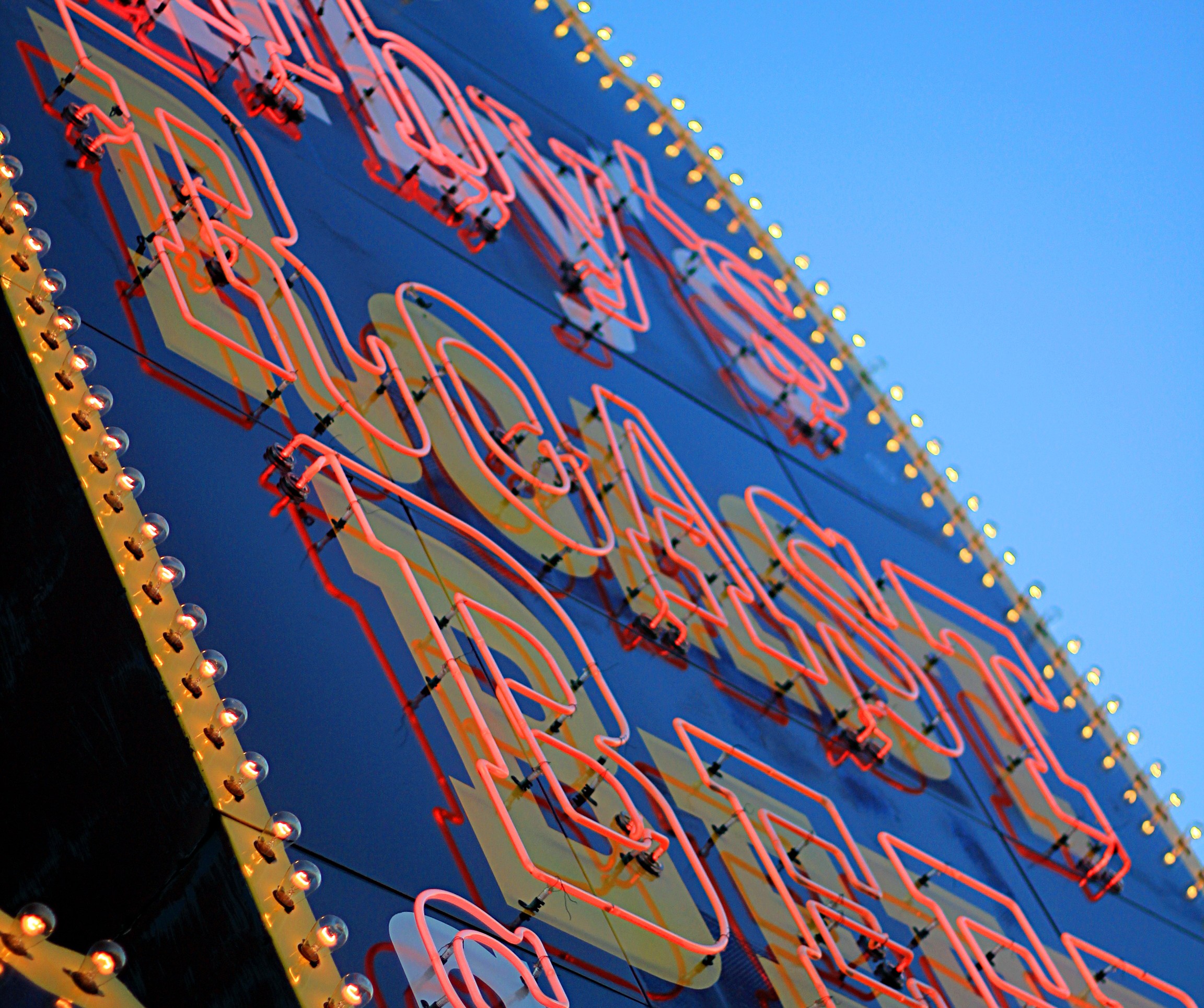Featured image credit: Michael Hicks
For long-time residents of LA, the Arby’s Hollywood location on Sunset Boulevard needs no introduction. The dated neon radiance of its sign, a glowing artifact from a different era, seemed to absorb into the civic landscape. The more you drove by it, the less it seemed to be there. Then, in the middle of July, Arby’s Hollywood shuttered with seemingly no warning. Boards were nailed up, graffiti was laid down, and Hollywood’s least-appreciated fast-food establishment was a quickly fading memory. Well, almost. A movement to preserve the original Arby’s sign is currently underway. And it places further pressure on the tensions between pro-development YIMBYs and nostalgic conservationists.
Why Did Arby’s Hollywood Location Close?

Since January 1969, the Arby’s Hollywood location has promised roast beef refreshment to passing motorists from its spot at 5920 Sunset Boulevard. At just a stone’s throw from the 101 freeway ramps, it obviously enjoyed its day in the sun. However, Arby’s brand never hit the same stride as global giants like McDonald’s, Subway, and Burger King.
Perhaps part of this was its niche product range. Generally, fast food roast beef just isn’t as palatable as say a Big Mac or a Whopper. It also became somewhat of a pop cultural punchline starting in the 1990s with frequent negative references on shows like The Simpsons and The Daily Show. But the latest strike against Arby’s is one the world felt as a whole: the global COVID-19 pandemic. This last one is largely responsible for the closure of Arby’s Hollywood location after 55 years.
“Truth is, I think it was the pandemic that did us in,” Marilyn Leviton explained to KTLA 5 News after shuttering the Arby’s Hollywood location which she’d owned since its opening. “I really feel like we would have closed during the pandemic (if it weren’t) for the federal loans.” The 91-year-old former business owner also cited new minimum wage laws as hastening the location’s demise. But when the restaurant was boarded up in June, there was no sign of resentment. Rather, the marquis beneath the glowing cowboy hat logo simply read “Farewell Hollywood – TY For 55 Great Years.”
Life After Arby’s

In most cases, that would be the end of the story. But a perplexing outcry followed the closure of Arby’s Hollywood. Despite no one seeming to care one way or another about the fast food chain’s sole Hollywood location, a small fragment of Angelenos seemed to actively grieve the loss. Leviton’s struggles would seem to indicate this was about more than roast beef sandwiches.
In early July, Blake Megdal, who owns the property where Arby’s Hollywood stood, signed a contract with Prince Street Pizza authorizing a drive-thru pop-up. It will open for business on August 8 and run until October 31. And while plans are still moving forward with the pop-up, a bizarre preservationist movement may render it a little harder to find.
By late July, the Cultural Heritage Commission of Los Angeles issued an official letter to the property owner, stipulating that the neon Arby’s sign is under consideration for cultural landmark status. This means the sign is now protected from being altered, removed, or demolished until the commission returns with a verdict. They are scheduled to visit the site on Thursday, August 8… the same day Prince Street Pizza opens for business.
Cultural Preservation or NIMBYism?

While this staunch preservationism may speak to civic pride at first glance, it’s a little more complicated. It presents yet another incident in a long line of situations pitting pro-development Angelenos against those who frequently oppose development under the guise of historical preservation among other reasons. The latter is colloquially referred to by the unflattering acronym NIMBY (standing for “Not in My Backyard”). In short, “I support development… just not in my backyard.” Development proponents have christened themselves with the tongue-in-cheek acronym “YIMBY”, naturally standing for “Yes in My Backyard.”
Yet, while the names are silly, the debate is deadly serious. YIMBYs fight for crucial housing development which is deeply inadequate in the state of California. Meanwhile, conservationists caution that we’ll lose our history and culture with overzealous development. In the case of this heated debate, both sides make impassioned pleas that have moments of logic and reason.
Was Arby’s Hollywood Culturally Significant?
But is an Arby’s sign really steeped in Angeleno culture? Or is this simply displaced nostalgia at the cost of forward movement? LA is replete with cultural structures worthy of preservation. Yet the fight has now carried to a fast food sign from 1969 that’s more popular than the business it promoted. And while there are no disclosed plans to raze the former Arby’s Hollywood building to create new housing, the battle over the sign highlights a profound disparity of opinion. It seems the sensible compromise would be to relegate the oddly beloved sign to an interested museum.
That was more or less the fate of the rotating Happy Foot/Sad Foot sign at the gateway of Silver Lake and Echo Park. When the sign (which advertised a foot clinic) was retired, it was “rescued” by a local collector who runs the Y-Que Trading Post in Los Feliz. To this day, visitors can appreciate the sign at the back of the shop. The Arby’s sign isn’t even a unique creation. You’ll find similar signage at locations across the United States. For this reason, among many, it seems likely that the days of the Arby’s Hollywood sign are numbered. But then again, we live in Los Angeles. Stranger things happen here every day.




